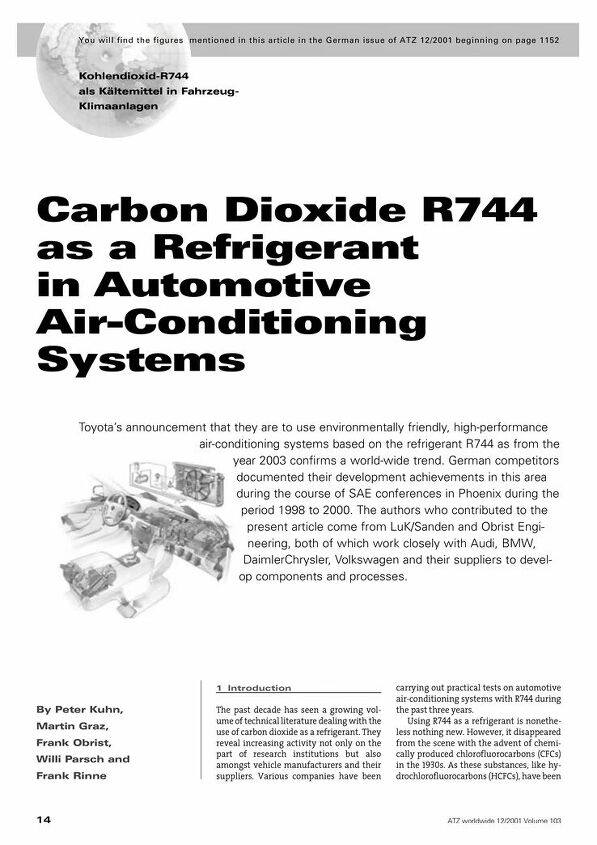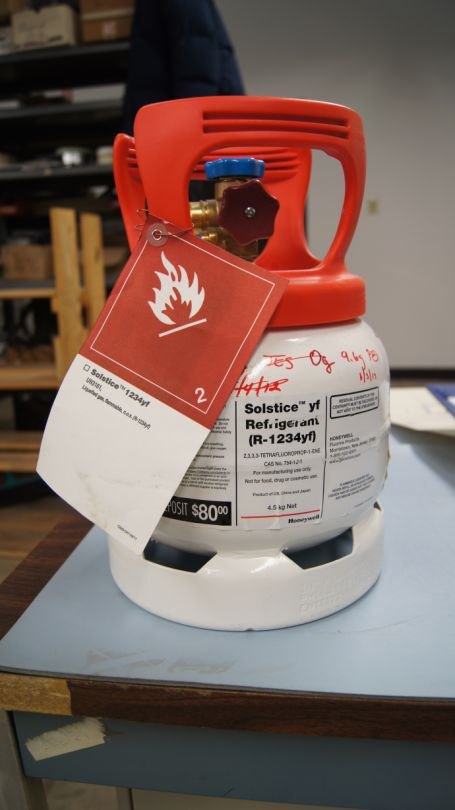#r134a
EU Orders Germany To Cease Use Of R134a Within Two Months
After months of investigation regarding the German government’s support of Daimler’s continued use of R134a — in violation of a law mandating use of refrigerants “with a global warming potential no more than 150 times that of carbon dioxide” — the European Commission has given Germany two months to comply with the law, or be fined and taken to court.
French Court Overturns Sales Ban Of Daimler Vehicles Using R134a
France’s Conseil d’Etat announced Monday that it has overturned the government’s ban of a handful of Mercedes-Benz vehicles over parent company Daimler’s refusal to cease usage of R134a coolant currently under phase-out by the European Union.
EU Starts Legal Proceedings Against Germany in R134a Dispute With Daimler
The legal struggle has heated up between Daimler and the European Commission over the automaker’s continued use of R134a air conditioning refrigerant, which has been banned by the EU, in some of its models. “We are opening a procedure against Germany. This is not a final decision by the Commission,” EU industry commissioner Antonio Tajani said.
Germany has two months to respond. The procedure for adjudicating the violation of EU rules is a multi-step process which normally takes months. The German government is backing Mercedes-Benz and the dispute could ultimately end up in the European Court of Justice, with the possibility of heavy fines and the recall of about 130,000 Mercedes-Benz A-Class, B class, CLA and SL cars.
French Court Allows Sale of R134a Equipped Mercedes Benzes, Daimler to Move to Carbon Dioxide Refrigerant
In the continuing saga of Daimler, the EU and banned refrigerants, the German automaker won a provisional ruling from France’s highest administrative judicial body to overturn the suspension of the sale of Mercedes-Benz models equipped with R134a refrigerant in those cars’ air conditioning systems. European Union regulators have banned R134a but Daimler claims that the replacement, R1234yf, can create fire and toxicity safety issues. The French Council of State said that authorities in that country must resume registrations of those Mercedes-Benz models while the case goes on.
According to Bloomberg, the court in Paris ruled that there is “serious doubt” about the immediate environmental threat upon which the French government was basing the sales ban.
French Government Ignored Court Ruling, Invokes EU "Safeguard Procedure" to Reinstitute Ban On Mercedes-Benz Cars W/ R134a Refrigerant
The regulatory and verbal war between France and Germany over Mercedes-Benz’s refusal to switch to the R1234yf air conditioning refrigerant has escalated. After a French court ordered a 10 day stay, lifting that country’s ban on R134a equpped A Class, B Class, CLA and SL cars made since June, Daimler expressed confidence that the French government would abide by that ruling. That confidence was apparently badly placed because the French government has now invoked a “safeguard procedure” of the EU that allows member countries to act unilaterally to avoid a serious risk involving the environment, public health or traffic safety, reinstituing the ban. Daimler promised that it would continue fighting to allow the sale of those cars in France. It claims that the new refrigerant is dangerously flammable and toxic.
Honeywell Dismisses Daimler's Distress Over R1234yf
Last week, the European Union Commission’s Technical Committee on Motor Vehicles meeting affirmed France’s refusal to allow Mercedes-Benz to sell cars using R134a refrigerant, and alsom indicated that other EU countries may block the sale of those cars as well. Now, Honeywell International, which owns the rights to R1234yf, (the only refrigerant currently approved by the EU) said that Daimler’s concerns are unfounded. M-B had run tests showing that under certain circumstances, leaks in the air conditioning system could cause underhood fires, and that when it burns, R1234yf produces poisonous hydrogen flouride gas.
Daimler Loses Another Round With EU Over R1234yf, Ban on Sale of R134a Equipped M-B Cars Likely to Spread Throughout Europe
When we last reported on France banning some Mercedes-Benz vehicles because the company refuses to use the now mandated R1234yf refrigerant, representatives from all 28 EU member states were scheduled to meet with the EU’s Technical Committee on Motor Vehicles to discuss the matter, particularly as it regards the sale of M-B vehicles in the 27 other EU countries besides France. That meeting has since taken place and according to a memo issued by the European Commission, those representatives have confirmed that all new vehicles sold throughout the EU must use R1234yf, and that any vehicles with the now banned R134a must be withdrawn from the market in all EU states. The dispute is over the fire safety of the new refrigerant. R134a was banned because it is considered a greenhouse gas.
Daimler Loses A Round With EU Over R134a Refrigerant, Full EU Commission Meets
The EU Commission has provisionally sided with France in that country’s decision to stop the sale of new Mercedes-Benz cars because of Daimler’s decision to continue to use R134a refrigerant in it’s HVAC systems. The EU has banned R134a out of concerns for global warming. The only available replacement that meets the new regulations is R1234yf, made by Honeywell, and Mercedes-Benz has insisted that their tests show that the new refrigerant is dangerously flammable and could start an underhood fire under certain conditions. The provisional ruling could be a problem for Daimler in other EU countries.























Recent Comments